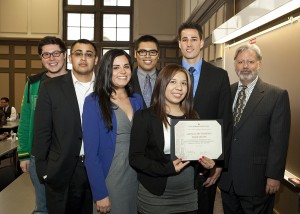
2011-2012 members of Latino Law Students Association accept the award for the 2012 Overall Outstanding Student Organization at the Student Bar Association’s annual Spring Fling in April. William Powers (right), associate dean for Admission and Students Affairs, presents award to (from left) Chris Cardona, Carlos Aparicio, Adelina Zepeda, John Antia, Daissy Dominguez and Travis Jeffries.
Since opening its doors in 1899, The John Marshall Law School has welcomed students based on aptitude and an eagerness to learn—not on income, race or class.
This spirit is reflected in the Latino Law Students Association (LLSA)’s latest endeavor, the Academic Enhancement Program (AEP). Supported by the Office of Diversity Affairs and Outreach, the AEP assists students academically with a rigorous approach and encourages extracurricular involvement. Since launching the program in August of 2011, many students—members of LLSA, Black Law Students Association (BLSA) and Middle Eastern Law Students Association (MELSA)—have seen improvements in their grades.
The program works through study groups that are divided by how far along each student is in his or her studies. Each group is led by a 2L or 3L instructor, who leads weekly lectures and assessment sessions. Toward the end of each semester, AEP offers additional workshops that offer exam-taking tips.
“The students were very grateful for the support that was provided by their peers,” said 3L Daissy Dominguez, 2012-2013 LLSA president, who spearheaded the development of AEP in 2011.
Though students got AEP off the ground, members of the faculty and administration recognized a need for this helping-hand program. Numbers had shown lower retention numbers among minority students.
“It is not unusual for minority and nontraditional students to have more challenges,” said Rory Smith, associate dean for Outreach and Planning. “Groups of students that have negative stereotypes are also challenged by what is known as a ‘stereotype threat,’ which manifests in test anxiety, discomfort in speaking up, diminished self-confidence and becoming withdrawn and disconnected. One of the intended outcomes of AEP is to breakthrough these challenges.”
Professor Rogelio Lasso saw this occurring among John Marshall’s minority students, and discussed with Smith the idea of an academic assistance program with students providing support and mentorship, in a welcoming atmosphere.
“AEP is intended to be a safe environment where students don’t face this stereotype threat,” Smith said.
Lasso knows it takes analytical skills to graduate and pass the bar, but those skills are a matter of development.
“Success of the student depends on how they develop analytical skills,” Lasso said, “but there is no reason why [dismissal from John Marshall] should happen.”
During her first year, Dominguez saw some of her classmates at John Marshall, who she describes as “smart, hardworking individuals,” being dismissed from the law school.
“I knew they were capable of doing well in law school and they were studying every day, but just needed more assistance,” Dominguez said.
Dominguez began organizing 1L study groups for finals among LLSA members, which caught Lasso’s attention. Dominguez was interested in designing and implementing a retention program that would benefit LLSA membership.
“We wanted the program to not only assist students academically but encourage them to join and become involved with student organizations,” Dominguez said.
Under Lasso’s tutelage, the AEP program was created by Dominguez with Smith’s support and coordination. Lasso said the program aims to make sure students utilize study habits and concepts that they will continue to use in their legal careers.
And, the program operates under a strict attendance policy. “We are not going to let you slack,” Lasso said. “We decided anyone who skipped would be out of the program.”
During the fall 2011 semester, AEP welcomed 20 1L students, and soon grew. Its success inspired LLSA to expand the program to members of BLSA and MELSA. Students enrolled in the program have seen improvements in their grades.
“The first year, we saw a dramatic change in students’ self-confidence,” Lasso said.
According to Dominguez, student involvement in AEP encouraged more participation within the three student organizations, participation in honors programs, and some students have received scholarships and CALI awards.
“The program has not only encouraged academic excellence but it has encouraged 1Ls to give back to our organizations and eager to run for executive board positions for this upcoming year,” Dominguez said.
Chris Cardona, a 1L student in AEP in 2011-2012, remembers: “In orientation the importance of staying organized and studying outside of class was stressed, but for me, who has never had that kind of discipline, saying and doing are very different things.” The AEP offered Cardona a forum where he could review material with a small group of classmates, in an organized and structured way. It also made students more comfortable to ask for clarification on difficult topics.
“The 2L and 3L students provided us with a better understanding of the topics we were learning in the classroom, but they also gave us insight into what we needed to know outside the classroom,” Cardona said.
Through AEP Cardona befriended a number of people in his section, and it increased his commitment to LLSA.
“By regularly attending LLSA meetings, I was informed about various programs including Judges Luncheon and Fiesta. Being active in LLSA led me to be a part of the executive board.” Cardona is now academic chair for LLSA.
In April 2012, the success of the AEP helped LLSA receive the 2012 Overall Outstanding Student Organization and Outstanding Minority Student Organization awards at the Student Bar Association’s annual Spring Fling.
Dominguez spent her 2012 summer expanding the AEP program. “The current structure has proven to be very effective but there is always room for improvement!”



